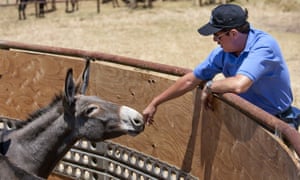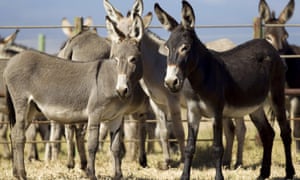Herd that once numbered 500 has been reduced to 50 in an effort requiring the social animals to be adopted with fellow creatures: They have to have a friend... Hawaiians are rounding up the last 50 donkeys of a feral herd that once roamed 500 strong, and searching for residents to take the asses in.
David Paul Sennett, for instance, had a stuffed donkey as a child but always wanted a real one. Decades later, his childhood dream came true when he adopted Barney, a wild donkey from Hawaiis Big Island who was orphaned when his mother was killed by a car.
Hes just like a big dog. He loves to eat bananas and papayas, said Sennett. Hes very friendly.
About three years later, Sennett is about to adopt another donkey, one of the remaining 50 wild donkeys on Hawaiis Big Island. The donkeys are the last of more than 500 that were cast-offs from the early days of Hawaii coffee and agricultural plantations.
Were hoping to get a female thats pregnant and then well have a family, said Sennett.
The Humane Society of the United States and Big Island residents were working Friday to prepare the remaining donkeys for adoption, marking the final step in a six-year effort to get them in adoptive homes. All the donkeys will get checked by a veterinarian before theyre taken to their new homes.

When drought conditions forced the donkeys into residential areas in search of water, the herd became a problem. The animals wandered into roadways, tore up golf courses and drank from swimming pools, said Inga Gibson, the Hawaii state director for the Humane Society of the United States.
One of our first complaints was the donkeys were actually coming into the schoolyard, said Gibson, adding that some residents were so fed up with the donkeys that they threatened to kill them. Some wanted to use their meat to make jerky.
The herd went entirely unmanaged for nearly 40 years because the donkeys werent considered game or endangered animals, Gibson said.
Its believed the animals were moved to Waikoloa from Kona in the 1970s when development grew in the area, she said.
The Humane Society stepped in six years ago after getting calls from concerned residents, and Gibson said the group had spent thousands to get more than 450 donkeys in homes, including 120 that were flown to California.
It was a daunting situation initially, like: what are we going to do with 500 feral donkeys? she added. It was really just an amazing community effort, and we didnt receive any kind of government support or funding.

Before adoption, the donkeys must have a clean bill of health and the males must be castrated, which is an easier and less invasive process than spaying the females, he said.
Gibson said about 80% of the remaining 50 donkeys have potential homes. Hopeful donkey owners must go through a screening process to make sure they have enough land and know how to care for the animals.
Donkeys are social animals, so they must be adopted in pairs or have another animal to keep them company at their new home, she added.
The adoption clause is no lone donkey, she said. They have to have a friend.
Read more: https://www.theguardian.com/us-news/2016/may/21/hawaii-feral-donkey-adoption
























